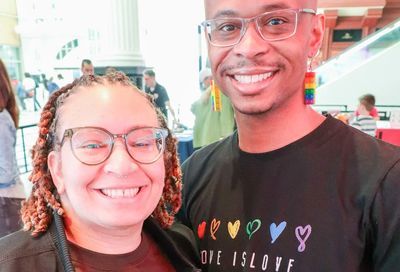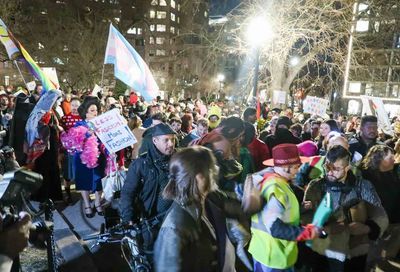Gay History Month
Gay History Month or not, it's hard not to notice markers and milestones of GLBT history in recent days
In September, for example, the Library of Congress announced that a collection of materials from pioneering gay-rights local Frank Kameny, known as the Kameny Papers, are now cataloged and ready for researchers.
”The library does what it does. It assigned people to systematize them and sort them out,” says Kameny, whose collection of documents, picket signs and the like found a friend in Charles Francis, a local man who helped fund the effort to gather the collection for induction into the library in late 2006. ”Anybody can go in and look them over. Mine have simply joined the individual collections. Charles and I will probably be going over there in the next couple of weeks to see it all.”
As the Library of Congress makes this step allowing a greater understanding of GLBT history, it has also been making history of its own, ignominiously, in a lawsuit won last month by Diane Schroer. The suit was initiated when the library rescinded an offer of employment made to Schroer after administrators learned that Schroer would be transitioning from an outwardly male identity to her female gender identity before reporting to work.
It’s testament that GLBT history is being made every day, though Washingtonians need never look far for that history. Whether it’s to S Street NW, home to Georgia Douglas Johnson’s Saturday night salons of the early 20th century that saw some of the brightest stars of the African-American GLBT scene — Langston Hughes, Angelina Weld Grimké, Alain Locke and others — then home to the Gay Liberation Front communes of the 1970s, or simply to the Supreme Court, where homophobic sodomy laws were struck down in 2003, there’s no missing the richness of GLBT history.
It even pops up in surprising ways, as reported by the local Gay and Lesbian Activists Alliance shortly after Paul Newman’s death last week.
”As we join other Americans in mourning the death of actor and philanthropist Paul Newman, many of you may not know the role that he and his wife, Joanne Woodward, played in the birth of GLAA 37 years ago,” wrote GLAA’s Rick Rosendall. ”On March 23, 1971, Frank Kameny made history as a candidate in the District of Columbia’s first election for Delegate to Congress. … The day before the election, Kameny for Congress received a check for $500 from Paul Newman and Joanne Woodward.”
Too late for the election, that money was used to send some of Kameny’s campaign staff to meet with the Gay Activists Alliance in New York, which had helped on Kameny’s campaign. That trip led D.C. activists to found the Gay Activists Alliance in 1971, precursor to the Gay and Lesbian Activists Alliance.
To celebrate Gay History Month, Metro Weekly invites you learn more about where we’ve been to better chart the course for where we’re going.
Support Metro Weekly’s Journalism
These are challenging times for news organizations. And yet it’s crucial we stay active and provide vital resources and information to both our local readers and the world. So won’t you please take a moment and consider supporting Metro Weekly with a membership? For as little as $5 a month, you can help ensure Metro Weekly magazine and MetroWeekly.com remain free, viable resources as we provide the best, most diverse, culturally-resonant LGBTQ coverage in both the D.C. region and around the world. Memberships come with exclusive perks and discounts, your own personal digital delivery of each week’s magazine (and an archive), access to our Member's Lounge when it launches this fall, and exclusive members-only items like Metro Weekly Membership Mugs and Tote Bags! Check out all our membership levels here and please join us today!

















